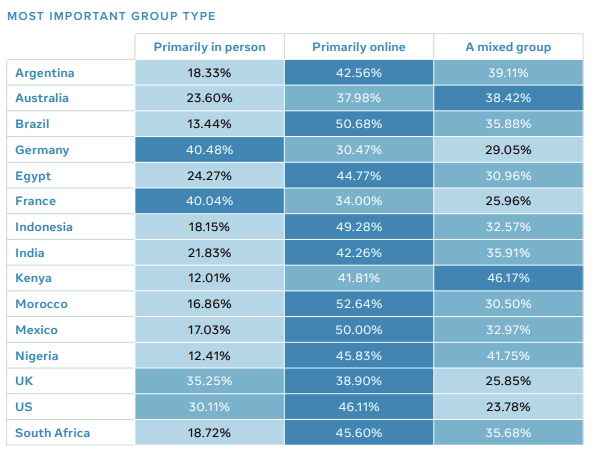SOCIAL
New Report Looks at the Rising Influence of Online Communities

Throughout the pandemic, digital connectivity has played an increasingly important role in how we stay connected, which, for many, has exacerbated their reliance on online groups, with Facebook groups, in particular, seeing a significant rise in engagement.
But how significant are Facebook groups to overall activity, and what role do they really play in our day-to-day interactions? To provide more context on this, Facebook recently worked with researchers from The Governance Lab at NYU to provide new insights into the importance of online communities.
The research was conducted via interviews with 50 leaders of Facebook Groups in 17 countries, along with 26 global experts in online community building. The researchers were also given access to internal Facebook insights, and ran a parallel YouGov survey of 15,000 Internet users in 15 countries.
That’s a broad scope of responses – so what does the research show?
First off, the data suggests that online groups are now increasingly important to connection.
“In the survey, about a thousand respondents in each of 15 countries were asked whether the most important group they belonged to operated primarily online or offline, or in both those spaces. In 11 out of 15 countries, the largest proportion of respondents reported their most important group as primarily online, and in three of those countries that proportion was 50% or more of respondents.”

That’s a significant finding, while overall, 77% of respondents indicated that the most important group they’re a part of now operates online.

The findings underline the growing relevance of online groups, which enable people to stay connected at all times, and on a broad range of topics.
Digging deeper, the researchers were able to establish four key elements in the growth and resonance of online groups.
1. Digital technology enables groups to form at unprecedented scale and speed
That’s both a blessing and a curse – having the capacity to connect with far more like-minded and like-interested people can open your world to a range of new opportunities. But that has also lead to the facilitation of hate groups and dangerous movements, with people also able to connect with others who share certain ideologies. Facebook is working to address this element, but used well, the capacity to connect around shared interests is now greater than ever before.
2. Online groups enable marginalized people to build community
Another key benefit of being able to connect with like-minded people is that it enables isolated users to feel less alone, and to establish connections with those with similar experiences. This can lead to strong bonds, which increases the importance of those connections.
3. Online and offline spaces complement each other
The researchers also found common linkage between online communities and real-life connection, which can be another key benefit to establishing digital groupings. By first establishing friendships online, that lends itself to real world meet-ups, which can be key for mental health and community.
4. The COVID-19 pandemic has put many online groups center stage
And of course, the pandemic has played a role in growing online connections, as people haven’t been able to get out in real life and meet with friends and family as they normally would. That’s increased reliance on Facebook groups for social engagement, which is an important role in community building.
The findings are not ground-breaking, in the sense that many of these trends are likely as you would expect. But they do further underline the importance of Facebook groups, and the power they can have in building relevant connections and communities. Which, for brands, can be an important consideration in how you use groups to build connection with your audience, or how you utilize groups within any outreach strategy. Brand usage is not the key focus of this report, but the findings have implications for anybody looking to use groups within their strategies.
Facebook groups are used by over 1.8 billion people every month, with more than half of all the people using Facebook now members of five or more groups. There are also 70 million people leading these groups as admins and moderators, and the report lays out key lessons and learnings for those looking to become community leaders, and how to provide more support for these users.
There’s a heap of interesting insights for group admins and creators. You can download the full report here.
SOCIAL
Snapchat Explores New Messaging Retention Feature: A Game-Changer or Risky Move?

In a recent announcement, Snapchat revealed a groundbreaking update that challenges its traditional design ethos. The platform is experimenting with an option that allows users to defy the 24-hour auto-delete rule, a feature synonymous with Snapchat’s ephemeral messaging model.
The proposed change aims to introduce a “Never delete” option in messaging retention settings, aligning Snapchat more closely with conventional messaging apps. While this move may blur Snapchat’s distinctive selling point, Snap appears convinced of its necessity.
According to Snap, the decision stems from user feedback and a commitment to innovation based on user needs. The company aims to provide greater flexibility and control over conversations, catering to the preferences of its community.
Currently undergoing trials in select markets, the new feature empowers users to adjust retention settings on a conversation-by-conversation basis. Flexibility remains paramount, with participants able to modify settings within chats and receive in-chat notifications to ensure transparency.
Snapchat underscores that the default auto-delete feature will persist, reinforcing its design philosophy centered on ephemerality. However, with the app gaining traction as a primary messaging platform, the option offers users a means to preserve longer chat histories.
The update marks a pivotal moment for Snapchat, renowned for its disappearing message premise, especially popular among younger demographics. Retaining this focus has been pivotal to Snapchat’s identity, but the shift suggests a broader strategy aimed at diversifying its user base.
This strategy may appeal particularly to older demographics, potentially extending Snapchat’s relevance as users age. By emulating features of conventional messaging platforms, Snapchat seeks to enhance its appeal and broaden its reach.
Yet, the introduction of message retention poses questions about Snapchat’s uniqueness. While addressing user demands, the risk of diluting Snapchat’s distinctiveness looms large.
As Snapchat ventures into uncharted territory, the outcome of this experiment remains uncertain. Will message retention propel Snapchat to new heights, or will it compromise the platform’s uniqueness?
Only time will tell.
SOCIAL
Catering to specific audience boosts your business, says accountant turned coach

While it is tempting to try to appeal to a broad audience, the founder of alcohol-free coaching service Just the Tonic, Sandra Parker, believes the best thing you can do for your business is focus on your niche. Here’s how she did just that.
When running a business, reaching out to as many clients as possible can be tempting. But it also risks making your marketing “too generic,” warns Sandra Parker, the founder of Just The Tonic Coaching.
“From the very start of my business, I knew exactly who I could help and who I couldn’t,” Parker told My Biggest Lessons.
Parker struggled with alcohol dependence as a young professional. Today, her business targets high-achieving individuals who face challenges similar to those she had early in her career.
“I understand their frustrations, I understand their fears, and I understand their coping mechanisms and the stories they’re telling themselves,” Parker said. “Because of that, I’m able to market very effectively, to speak in a language that they understand, and am able to reach them.”Â
“I believe that it’s really important that you know exactly who your customer or your client is, and you target them, and you resist the temptation to make your marketing too generic to try and reach everyone,” she explained.
“If you speak specifically to your target clients, you will reach them, and I believe that’s the way that you’re going to be more successful.
Watch the video for more of Sandra Parker’s biggest lessons.
SOCIAL
Instagram Tests Live-Stream Games to Enhance Engagement

Instagram’s testing out some new options to help spice up your live-streams in the app, with some live broadcasters now able to select a game that they can play with viewers in-stream.
As you can see in these example screens, posted by Ahmed Ghanem, some creators now have the option to play either “This or That”, a question and answer prompt that you can share with your viewers, or “Trivia”, to generate more engagement within your IG live-streams.
That could be a simple way to spark more conversation and interaction, which could then lead into further engagement opportunities from your live audience.
Meta’s been exploring more ways to make live-streaming a bigger consideration for IG creators, with a view to live-streams potentially catching on with more users.
That includes the gradual expansion of its “Stars” live-stream donation program, giving more creators in more regions a means to accept donations from live-stream viewers, while back in December, Instagram also added some new options to make it easier to go live using third-party tools via desktop PCs.
Live streaming has been a major shift in China, where shopping live-streams, in particular, have led to massive opportunities for streaming platforms. They haven’t caught on in the same way in Western regions, but as TikTok and YouTube look to push live-stream adoption, there is still a chance that they will become a much bigger element in future.
Which is why IG is also trying to stay in touch, and add more ways for its creators to engage via streams. Live-stream games is another element within this, which could make this a better community-building, and potentially sales-driving option.
We’ve asked Instagram for more information on this test, and we’ll update this post if/when we hear back.
-

 PPC7 days ago
PPC7 days ago4 New Google Ads Performance Max Updates: What You Need to Know
-

 PPC4 days ago
PPC4 days ago19 Best SEO Tools in 2024 (For Every Use Case)
-
SEARCHENGINES6 days ago
Daily Search Forum Recap: April 16, 2024
-

 MARKETING6 days ago
MARKETING6 days agoWill Google Buy HubSpot? | Content Marketing Institute
-

 SEO6 days ago
SEO6 days agoGoogle Clarifies Vacation Rental Structured Data
-

 PPC7 days ago
PPC7 days agoShare Of Voice: Why Is It Important?
-

 MARKETING5 days ago
MARKETING5 days agoStreamlining Processes for Increased Efficiency and Results
-

 PPC6 days ago
PPC6 days agoHow to Collect & Use Customer Data the Right (& Ethical) Way


